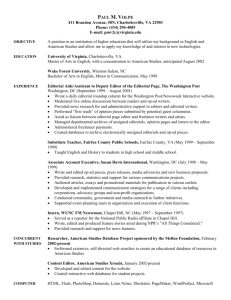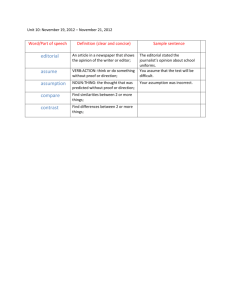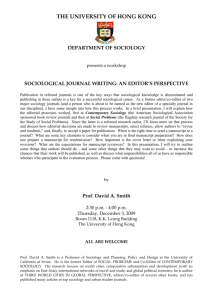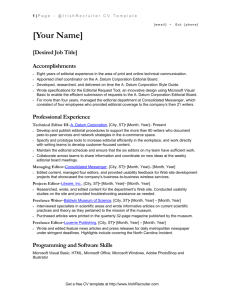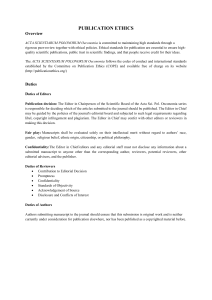Guidelines for Applications to Become
advertisement
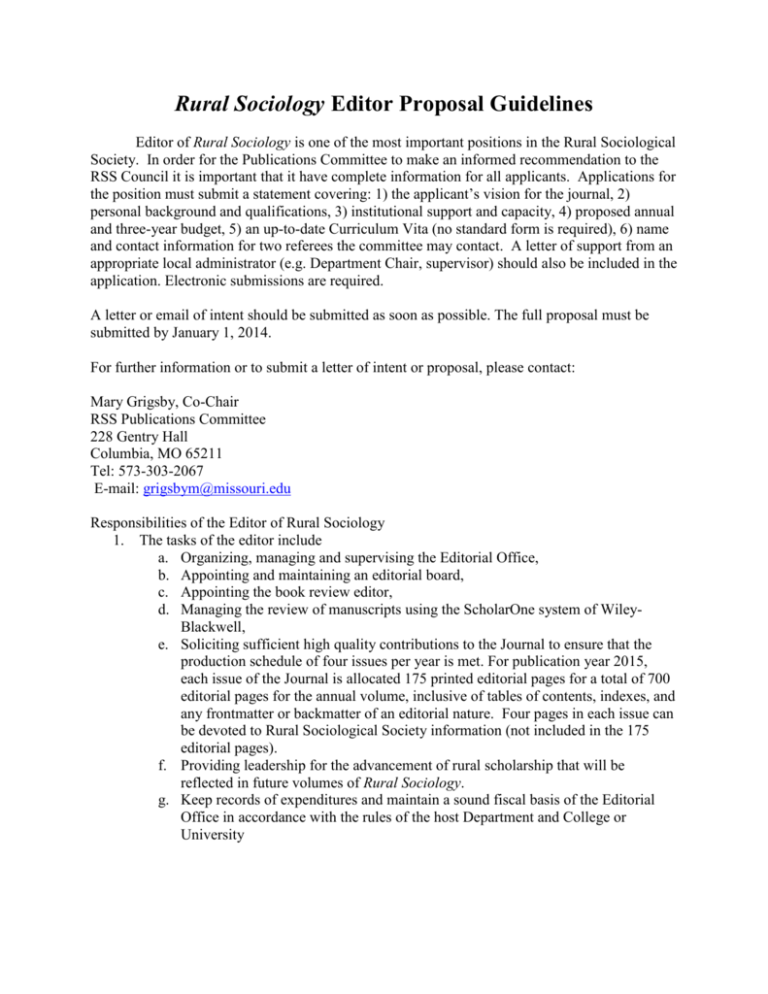
Rural Sociology Editor Proposal Guidelines Editor of Rural Sociology is one of the most important positions in the Rural Sociological Society. In order for the Publications Committee to make an informed recommendation to the RSS Council it is important that it have complete information for all applicants. Applications for the position must submit a statement covering: 1) the applicant’s vision for the journal, 2) personal background and qualifications, 3) institutional support and capacity, 4) proposed annual and three-year budget, 5) an up-to-date Curriculum Vita (no standard form is required), 6) name and contact information for two referees the committee may contact. A letter of support from an appropriate local administrator (e.g. Department Chair, supervisor) should also be included in the application. Electronic submissions are required. A letter or email of intent should be submitted as soon as possible. The full proposal must be submitted by January 1, 2014. For further information or to submit a letter of intent or proposal, please contact: Mary Grigsby, Co-Chair RSS Publications Committee 228 Gentry Hall Columbia, MO 65211 Tel: 573-303-2067 E-mail: grigsbym@missouri.edu Responsibilities of the Editor of Rural Sociology 1. The tasks of the editor include a. Organizing, managing and supervising the Editorial Office, b. Appointing and maintaining an editorial board, c. Appointing the book review editor, d. Managing the review of manuscripts using the ScholarOne system of WileyBlackwell, e. Soliciting sufficient high quality contributions to the Journal to ensure that the production schedule of four issues per year is met. For publication year 2015, each issue of the Journal is allocated 175 printed editorial pages for a total of 700 editorial pages for the annual volume, inclusive of tables of contents, indexes, and any frontmatter or backmatter of an editorial nature. Four pages in each issue can be devoted to Rural Sociological Society information (not included in the 175 editorial pages). f. Providing leadership for the advancement of rural scholarship that will be reflected in future volumes of Rural Sociology. g. Keep records of expenditures and maintain a sound fiscal basis of the Editorial Office in accordance with the rules of the host Department and College or University 2. The editor also will work with Wiley-Blackwell on marketing and strategic planning for the journal. This may involve the editor traveling to Wiley-Blackwell to meet with the publisher’s team about the advertising, sales and marketing strategies for the journal. 3. Copy editing services now are provided and paid for by the Publisher, Wiley-Blackwell 4. Financial support for the editorial office is available from the RSS. a. The support from the RSS for the editorial office of Rural Sociology is approximately $17,500 for the 2015-16 fiscal year. This can be negotiated with the RSS Executive Director and Treasurer, Ralph Brown (ralph_brown@byu.edu). b. These funds can be used for travel related to editor responsibilities such as attending professional meetings not ordinarily attended to solicit manuscripts and promote the journal, meeting with the Wiley-Blackwell editorial staff, paying for the managing editor to attend the RSS meetings, paying for a managing editor or other staff support for the editorial office, supplies and postage, payments to contributors and reviewers, and/or honoraria for the Editor and Editorial Board. The editor is not limited to these uses of the funds. How the funds will be used must be described in a proposed annual and three-year budget for the editorial office. 5. The editor of Rural Sociology may not act in a significant editorial capacity on any competing publication during the term of appointment as editor of Rural Sociology.
